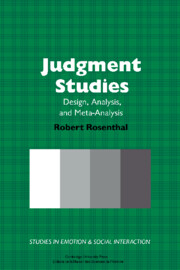Preface
Published online by Cambridge University Press: 06 November 2009
Summary
My interest in conducting judgment studies began over twenty-five years ago. I had been doing experiments showing that psychological experimenters might unintentionally affect the results of their research by virtue of their personal characteristics and, especially, by virtue of their expectations for experimental outcomes. Judgment studies were needed to try to find out how subtle aspects of the experimenter-subject interaction were predictive of the results of the research. Later, in our so-called “Pygmalion” studies we discovered that teachers' expectations for pupils' performance could also come to serve as self-fulfilling prophecies. Judgment studies were again needed to try to find out how teachers treated differently those students for whom they held favorable versus unfavorable expectations. In more recent years, my collaborators and I have continued conducting judgment studies examining not only experimenter-subject and teacher-student interactions but such other interactions as counselor-client, employer-employee, physician-patient, psychotherapist-patient, and other dyads of everyday life.
The contents and the introductory chapter tell in detail the content and purpose of this book. Very briefly, its purpose is to describe the design, analysis, and meta-analysis of judgment studies in sufficient detail (a) so that they can be conducted by readers of this book and (b) so that they can be wisely evaluated when they have been conducted by others.
- Type
- Chapter
- Information
- Judgment StudiesDesign, Analysis, and Meta-Analysis, pp. xi - xiiPublisher: Cambridge University PressPrint publication year: 1987



